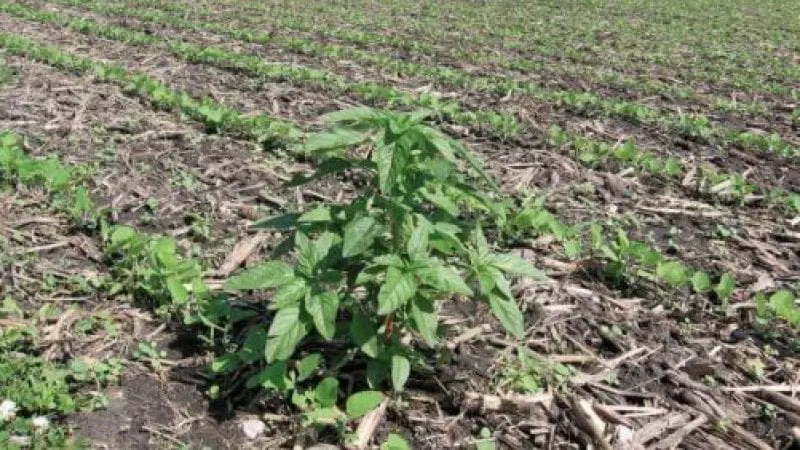Waterhemp weed uses genetic ‘tricks’ to outsmart herbicides, threatening farmers’ crop yields
Waterhemp weed uses genetic ‘tricks’ to outsmart herbicides, threatening farmers’ crop yields


The weed that represents the biggest threat to Midwestern corn and soybean production, waterhemp, has outsmarted almost every kind of herbicide on the market today.
University of Illinois scientists are working to reveal waterhemp’s tricks. Through years of research, they discovered the weed can ramp up production of detoxifying enzymes that neutralize certain herbicides before they can disrupt essential cellular processes. Metabolic resistance, as this strategy is known, is just one process by which waterhemp evades herbicides. Unfortunately, because there may be hundreds of detoxifying enzymes involved, metabolic resistance is hard to identify and even harder to combat.
In two recent studies, Illinois researchers explain metabolic resistance to three commonly used herbicides in waterhemp, getting closer to finding important genetic cues. Results also confirm the importance of using a multi-pronged approach to waterhemp control.
“These waterhemp populations are adapting and evolving incredible abilities to metabolize everything. It’s bad news, but at least we understand the mechanisms better. And ultimately, that understanding could potentially be exploited to use waterhemp’s metabolic arsenal against itself,” says Dean Riechers, professor in the Department of Crop Sciences at Illinois and co-author on both studies. “That’s one interesting way our research could be directly applied to controlling this weed.”
…
Experts say there are no new herbicide sites-of-action coming into the marketplace, so farmers will need to consider alternative methods of weed control.
“With metabolic resistance, our predictability is virtually zero. We have no idea what these populations are resistant to until we get them under controlled conditions. It’s just another example of how we need a more integrated system, rather than relying on chemistry only. We can still use the chemistry, but have to do something in addition,” says Aaron Hager, associate professor in the Department of Crop Sciences at Illinois and co-author on the Pest Management Science study. “We have to rethink how we manage waterhemp long term.”
Read the original post

 | Videos | More... |

Video: Nuclear energy will destroy us? Global warming is an existential threat? Chemicals are massacring bees? Donate to the Green Industrial Complex!
 | Bees & Pollinators | More... |

GLP podcast: Science journalism is a mess. Here’s how to fix it

Mosquito massacre: Can we safely tackle malaria with a CRISPR gene drive?

Are we facing an ‘Insect Apocalypse’ caused by ‘intensive, industrial’ farming and agricultural chemicals? The media say yes; Science says ‘no’
 | Infographics | More... |

Infographic: Global regulatory and health research agencies on whether glyphosate causes cancer
 | GMO FAQs | More... |

Why is there controversy over GMO foods but not GMO drugs?

How are GMOs labeled around the world?

How does genetic engineering differ from conventional breeding?
 | GLP Profiles | More... |

Alex Jones: Right-wing conspiracy theorist stokes fear of GMOs, pesticides to sell ‘health supplements’




 California, Washington, Oregon forge immunization alliance to safeguard vaccine access against federal undermining
California, Washington, Oregon forge immunization alliance to safeguard vaccine access against federal undermining Trust issues: What happens when therapists use ChatGPT?
Trust issues: What happens when therapists use ChatGPT? Fighting deforestation with CO2: Biotechnology breakthrough creates sustainable palm oil alternative for cosmetics
Fighting deforestation with CO2: Biotechnology breakthrough creates sustainable palm oil alternative for cosmetics Viewpoint — Fact checking MAHA mythmakers: How wellness influencers and RFK, Jr. undermine American science and health
Viewpoint — Fact checking MAHA mythmakers: How wellness influencers and RFK, Jr. undermine American science and health 30-year-old tomato line shows genetic resistance to devastating virus
30-year-old tomato line shows genetic resistance to devastating virus The free-range chicken dilemma: Better for birds, but with substantial costs
The free-range chicken dilemma: Better for birds, but with substantial costs Viewpoint: Video — Big Solar is gobbling up productive agricultural land and hurting farmers yet providing little energy or sustainabilty gains
Viewpoint: Video — Big Solar is gobbling up productive agricultural land and hurting farmers yet providing little energy or sustainabilty gains ‘You have to treat the brain first’:Rethinking chronic pain with Sanjay Gupta
‘You have to treat the brain first’:Rethinking chronic pain with Sanjay Gupta
